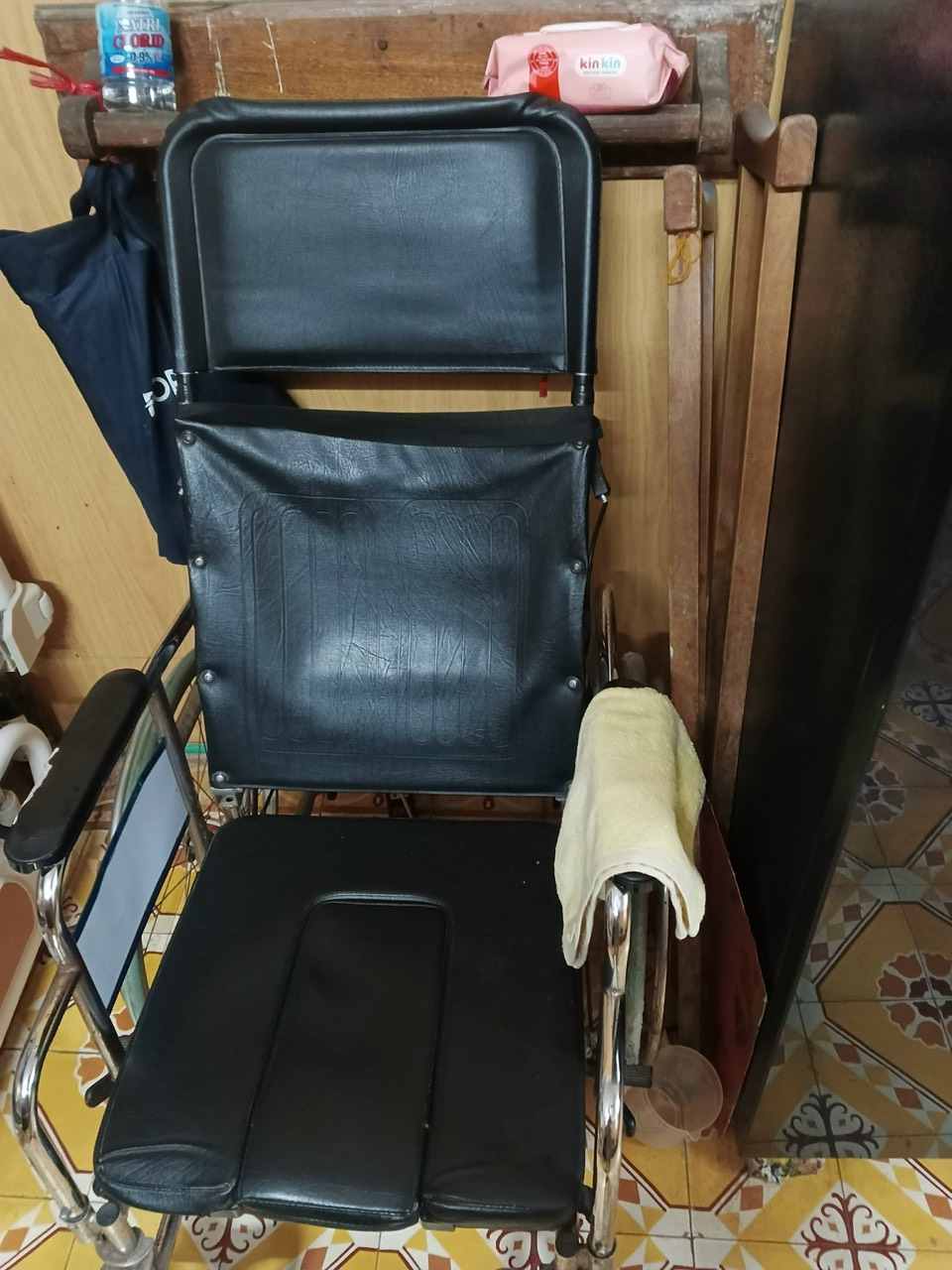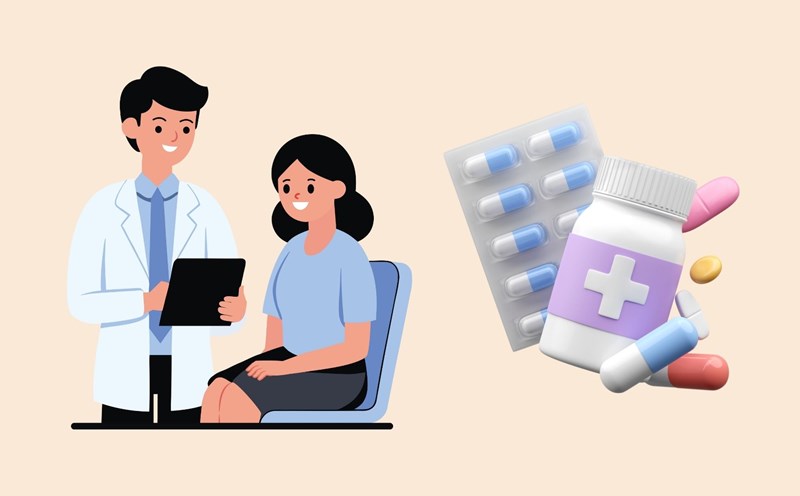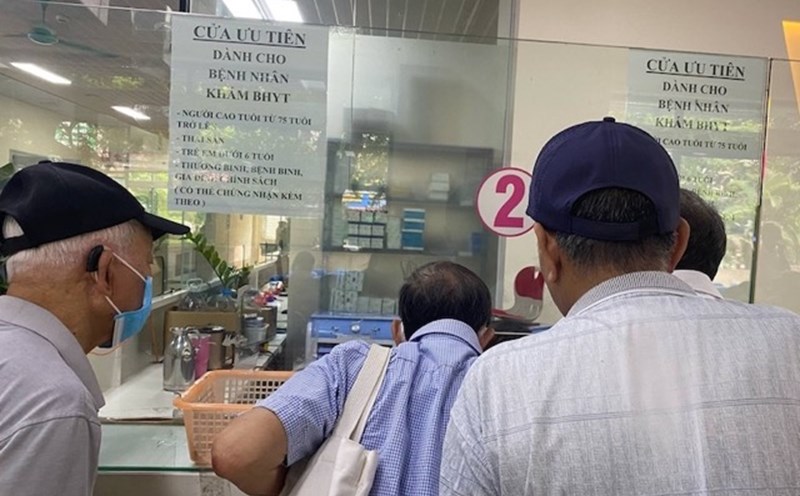Going and booking from midnight
Ms. Le Van Dung, in lane 68 Xuan Thuy, Cau Giay ward, Hanoi, has lived with diabetes for nearly 20 years. Every month, she regularly goes to Hospital E for health check-ups and receives treatment. To avoid the jostling wait, for many years, she and a group of neighbors with similar medical conditions took turns getting the number from 12pm. The next morning, they returned to the hospital at 6:30 a.m. to be examined early.
"Go get a number from night to get an early check-up in the morning, otherwise you have to fast for a long time, it is very tiring, and blood pressure can easily drop. We always want to be provided with medicine for a longer time, instead of only receiving medicine for a month each time, Ms. Dung shared.
Also suffering from diabetes, but Ms. Vu Thi Tham's situation, in lane 81 Nguyen Phong Sac, is even more difficult. Mrs. Tham has been paralyzed and has been lying in one place for more than 30 years. When more diabetes is detected, traveling to the Central Endocrinological Hospital every month for examination and treatment becomes even more difficult. Every time they move, the family has to rent a car, and relatives are busy helping her get up and down.

Previously, I was only given medicine once a month. After that, the hospital created conditions for me to take medicine every two months. Now that there is a regulation that medicine is given every three months, I am very happy. Every time I go to sign medicine, my children and grandchildren suffer much less, Ms. Tham expressed.
At the Breast Clinic, K Hospital, many patients expressed their joy when informed that they would be given medicine once every 3 months instead of having to be hospitalized every month to receive medicine.
Ms. Le Thi T (43 years old, Hung Yen) shared that she was diagnosed with stage 2 breast cancer, and has had surgery, chemotherapy and radiotherapy since 2024. After treatment, even though she only had to take a check-up every 3 months, she still had to take a whole day off every month to go to Hanoi to get medicine, which was very tiring and expensive. "This time being informed that I will be given medicine every 3 months, I am really happy," said Ms. T.
Sharing the excitement, Ms. Nguyen Thi M (in Tuyen Quang) also said that after 2023 breast cancer surgery and 8 rounds of chemotherapy, she still had to take hormonal medicine every month. Traveling from the province to the hospital to get medicine was very difficult, took a whole day and had to take a day off work. "When I learned that I was given medicine every 3 months, I was very happy. This is the wish of all patients from afar like me, Ms. M shared.
Chronic patients are given long-term medication
The Ministry of Health signed and issued Circular No. 26/2025/TT-BYT dated June 30, 2025 regulating prescriptions for drugs and prescriptions for pharmaceutical and biological products in outpatient treatment at medical examination and treatment facilities. The Circular takes effect from July 1, marking an important change to facilitate patients.
According to the new regulation, people with some chronic diseases on the permitted list will be prescribed outpatient medicines for more than 30 days, up to 90 days, instead of being only given medicines for up to 30 days as before according to Circular 52/2017.
The list includes 16 major groups of diseases, with a total of 252 diseases and groups of chronic diseases. These include many common diseases such as high blood pressure, diabetes, COPD, bronchitis, chronic hepatitis B, HIV/AIDS, Parkinson's, Alzheimer's, depression, anxiety disorder, congenital hemodystasis ( Thalassemia), hypothyroidism, lai offside, dementia and gynecological diseases in adolescence such as menopause. Some cancers such as breast cancer and thyroid cancer are also subject to long-term medication.
The Circular also clearly stipulates the prescription of addictive drugs to treat pain relief for cancer patients. In case the patient is treated at home and cannot go to a medical facility, it is necessary to have confirmation of continued treatment from the local health station with a summary of the medical record. Each prescription of addictive drugs must be up to 30 days, divided into 3 consecutive treatment sessions, each session must not exceed 10 days, and the start and end date must be clearly marked. The patient or representative must write a commitment to use the drug for the right purpose.
The Ministry of Health has implemented 3-month treatment medicine during the COVID-19 outbreak, when patients had difficulty going to the hospital periodically.
Prof. Dr. Le Van Quang, Director of K Hospital, said: The new regulation helps patients access accurate treatment regimens, limit drug abuse and reduce the risk of antibiotic resistance. The prescription process is transparent and convenient for inspection and supervision. Patients are also fully advised on drugs and treatment. Applying prescriptions according to the Circular not only reduces travel pressure, especially for patients living far from Hanoi, but also facilitates doctors and medical staff.
Dr. Vuong Anh Duong - Deputy Director of the Department of Medical Examination and Treatment Management (Ministry of Health) said that the doctor will decide on the number of days of use for each type of drug based on the clinical condition and stability of the patient, up to 90 days. In case the professional documents do not clearly state the time of taking the drug, the doctor can still prescribe a maximum of 90 days if appropriate.
The old medical examination book form is abolished, instead, the information will be recorded in the prescription and managed through paper or electronic medical records. The prescribing doctor must clearly state the number of doses used each time, the number of times per day and the total number of treatment days to ensure transparency and ease of monitoring.











